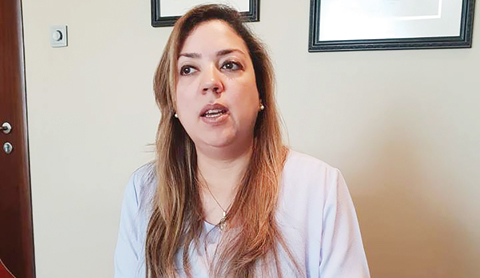Phenomenon common in Kuwait due to its small population: Dr Hands
 KUWAIT: Dr Joana Hands, Director of Kuwait Counseling Center, speaks to Kuwaiat Times.
KUWAIT: Dr Joana Hands, Director of Kuwait Counseling Center, speaks to Kuwaiat Times.
Stereotyping individuals based on their nationalities is common in many parts of the world, and is evident in Kuwait too. Dr Joana Hands, Director of Kuwait Counseling Center, told Kuwait Times about some of the reasons behind such behavior. Dr Hands is the lead doctor of the center and the president of the Middle East Psychological Association. She said stereotyping nationalities is almost similar to stereotyping people who visit psychologists. "If you visit a psychologist, people will automatically think you're crazy - a psycho. This is similar to stereotyping nationalities, discrimination and racism," she said.
She said stereotyping nationalities in Kuwait is more common due to its small population, and geographically speaking, Kuwait is a very small country. "So, people are labeled according to what is visible to them," she said. Dr Hands said it is normal and natural for human beings to make assumptions. "Stereotyping is very typical in this region because this country is very small and what we see here is measured according to our understanding," she said.
"This is connected to the way of thinking, of people's mindsets. In psychology, we have what we call a concept of pairing. It is the tendency of human minds to pair everything with anything - any subjects to people, and any people to any subject and so on to make our own concept of it. This is normal based on repetition and what we are familiar with. We tend to pair something with something familiar to us," she explained.
Concept of pairing
Dr Hands explained that in order to understand things, the easiest way is to compare or pair it with something. "In marketing strategy, in order for a product to be patronized, they have to have a concept of pairing. For example, why are advertisements for soft drinks or colas partnered with cheese, fruits and veggies? Because what they are trying is to project that it's OK to drink colas - it's healthy like those products. So, this is like playing with minds," she said.
"What I am trying to say is that it is a familiar norm to us as humans - we pair. Indians and Filipinos - people automatically assume they are housemaids, and they would be labeled immediately as domestic helpers. This is also the concept when we see Bangladeshis - we pair them with a specific job they are commonly associated with, like cleaners or janitors. We do not do sensible research or investigation - maybe that Bangladeshi is a bank manager, a professor or even a CEO. We do not bother ourselves to do some sort of questioning before reaching a conclusion," she argued.
On the other hand, Hands stressed that it is also the job of the other party to object, but not too defensively. "We know that this is wrong, but if we do not cooperate and continue to defend ourselves, we are missing the opportunities to stop it," she said. "Maybe you should try to talk to them politely and introduce yourself that you are so and so. By this you are helping them to recognize the fact that not all Filipinos or Indians are housemaids. The world is not only run by Americans or the English, French or Spanish - we are citizens of the world. There are more nationalities moving around. For example, Filipinos are all over the world, but they are not only into performing household chores - they are teachers, engineers, doctors and other professionals too," she said.
"We need to try harder to move away from the comfort zone that we are familiar with. Let us help people to not be impulsive and irrational. Assuming things is one of the biggest human weaknesses. Be rational - this is what that separates us from machines and animals. So how can we help? Through proper education and exposure. If you see stereotyping, try to correct people - don't be afraid to educate them. It's an opportunity to explain and reach out and talk about it. Awareness has to start, even in a small way," she noted. The Middle East Psychological Association along with the Kuwait Counseling Center will host the biggest psychological conference to be held in Kuwait in March next year.
By Ben Garcia






